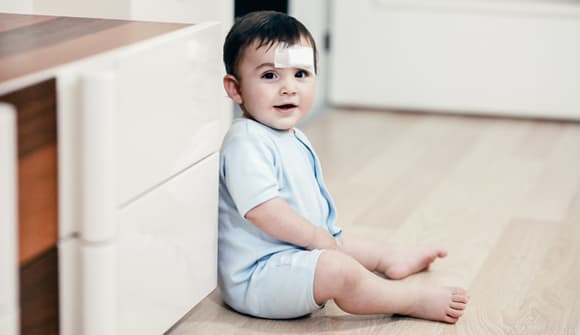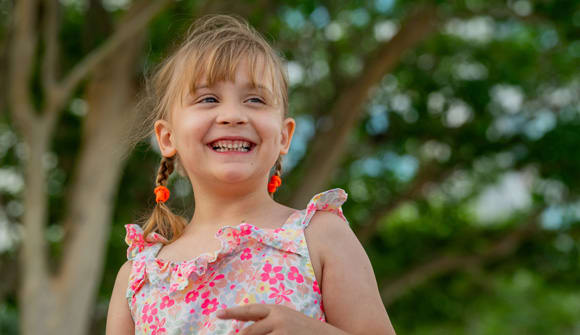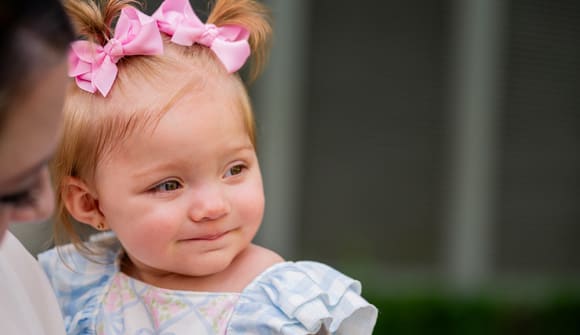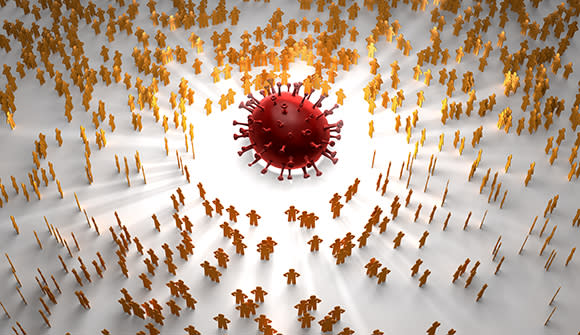Boo-boo or head trauma?
When to worry about a baby's head bump.
Article Date:

It’s scary to watch small children hit their heads, and yet it seems to happen a lot. Babies roll off the bed or changing table, toddlers tumble when climbing up onto the counter, and little ones practice running, only to trip and fall face-first.
Head bumps are one of the more common injuries pediatric emergency medicine specialist Amanda Cruz-Deweese, DO, sees at Wolfson Children’s Emergency and Porter Family Children’s Trauma Center. And while it’s fine for parents to rush their kids to the hospital, safe rather than sorry, most head injuries aren’t serious.
“Severe brain injuries, meaning those that require surgery, are quite infrequent,” said Dr. Cruz-Deweese. “For the vast majority of head injuries, the child will recover well on his or her own over time, including many skull fractures.”
Children and head injuries: far from fragile
When a head injury is serious, it can mean a major skull fracture or bleeding in the brain. That’s a hard pill for parents to swallow, so it’s natural to worry. But when it comes to the average head bump, kids are far from fragile.
In fact, children’s heads are particularly resilient, Dr. Cruz-Deweese said. Young skulls have sutures (openings) to allow their brains to grow, and these help to absorb the impact of a blow to the head. Also, those little noggins are pretty hard.
Is a bumped head an emergency?
It’s nearly impossible for a nonmedical person to diagnose a traumatic brain injury, Dr. Cruz-Deweese said. A serious brain bleed can happen under the skull, where it can’t be seen. On the other hand, a superficial “goose egg” swelling can look terrible and still not be serious.
When kids come to the ER for a head bump, doctors use several guidelines to decide if the injury could be serious. They ask whether the child:
- Fell more than 3 feet (for children under 2 years old).
- Fell more than 5 feet (for children 2 years and older).
- Was ejected from a car.
- Was unconscious for more than 5 seconds.
- Is confused, agitated or responding slowly to questions.
- Is vomiting.
- Has a severe headache.
- Is sleeping for long periods of time.
Doctors may treat mild symptoms and monitor the child for a few hours. Or, they may order a CT scan if a traumatic head injury is suspected. Parents, who don’t have these same tools, are left to simply trust their gut about whether to go to the ER, Dr. Cruz-Deweese said. If something feels off, get it checked out.
Head-bump myths
Before you load up the car, it may help to know about a few myths that don’t belong in the decision tree. Here are some notions that Dr. Cruz-Deweese said just aren’t true:
- It’s more than just a bump if one pupil is dilated. This actually only happens when a brain injury is extremely severe. That means a child with equal pupils could still have a serious injury.
- Don’t let the child fall asleep. This age-old guidance for a concussion has been debunked. Children often take a nap after they hit their heads; it helps them to heal.
- Swelling out is better than swelling in. It doesn't really matter which way the swelling goes. Either way can be serious, or not.
- Put a cold pack on the swelling or give your child over-the-counter pain relievers. These help with pain, but the swelling will also come down on its own, so don’t force your child to do it if he or she is resistant.
Since minor head injuries mostly heal on their own, a sweet treat may often soothe a child just as much as a cold pack!
If your child needs emergency treatment, we're here to help
Wolfson Children’s Hospital has physicians specially trained in pediatric emergency care ready to help 24/7. The team at Wolfson Children’s Emergency and Porter Family Children's Trauma Center cares for the area’s most critically ill and injured children. Wolfson Children’s Hospital has Emergency Centers located throughout Northeast Florida.



